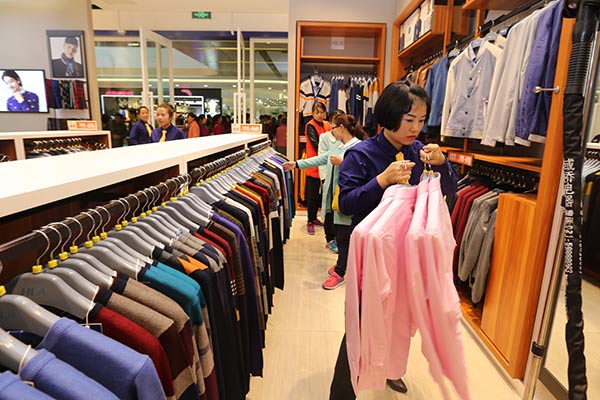Tech leaders battle for supremacy


Competition between Alibaba, Tencent intensifies in the offline retail market
The battle between China's top two internet heavyweights has reached a new high, with Tencent Holdings Ltd making an intensified push into the offline retail market, where its arch rival Alibaba Group Holding Ltd has an established presence.
Tencent's latest investment in Chinese menswear group Heilan Home Co Ltd, its third move into the retail market within a week, highlights its ambition to challenge Alibaba as the two are racing to reinvent old-school retailing with technology, analysts said on Monday.
Lu Zhenwang, CEO of Wanqing Consultancy in Shanghai, said it is high time for Tencent to make wider inroads into retailing, as its mobile payment service is already widely used in offline stores, laying a sound foundation for more innovative applications.
"E-commerce, where Alibaba holds a major presence, already hit a saturation point and in fact only accounts for less than 20 percent of China's retail market," Lu said.
"New retail, or those that integrate the online and offline shopping experiences, will be the future, and that is where Alibaba and Tencent fight hard, by leveraging their strength in big data and cloud computing."
Heilan said on Saturday that Tencent had spent 2.5 billion yuan ($397 million) for about 5 percent stake in the company. The two sides will also establish a 10 billion yuan industrial investment fund to focus on deals in the clothing sector.
Meanwhile, Tencent said it had signed a deal with Better Life Group, a major supermarket chain in China, to experiment with smart retailing services.
The moves came shortly after Tencent led an investment of 34 billion yuan in the commercial property arm of Dalian Wanda Group in late January, which created arguably the biggest tie-up between internet firms and brick-and-mortar commerce in China to renovate retailing.
Shen Meng, director of boutique investment bank Chanson & Co, said Heilan's roughly 5,500 brick-and-mortar stores, including those run by third-parties, are of interest to Tencent.
"New retailing does not just mean directing consumers to offline stores. It is more about helping shop owners digitalize supply chains and find a better way to deal with inventories. Heilan's sprawling physical retail presence offers a good application scenario of Tencent's big data technology," Shen said.
Heilan specializes in menswear, which is less subject to seasonal and fashion changes than womenswear, creating fewer risks, he added.
But it remains to be seen whether Shenzhen-based Tencent can gain an upper hand in the competition, given Alibaba's first mover advantage. Alibaba has also stepped up its efforts by acquiring major supermarket chains, from Sun Art Retail Group Ltd to Intime Retail Group Co, to fill in the blanks in the physical retail puzzle.
It has also upgraded systems for half a million mom-and-pop stores across the nation's far-flung counties and villages, with the hope of connecting friendly neighbors to the internet and providing them tools to better manage inventory using data analytics.




































